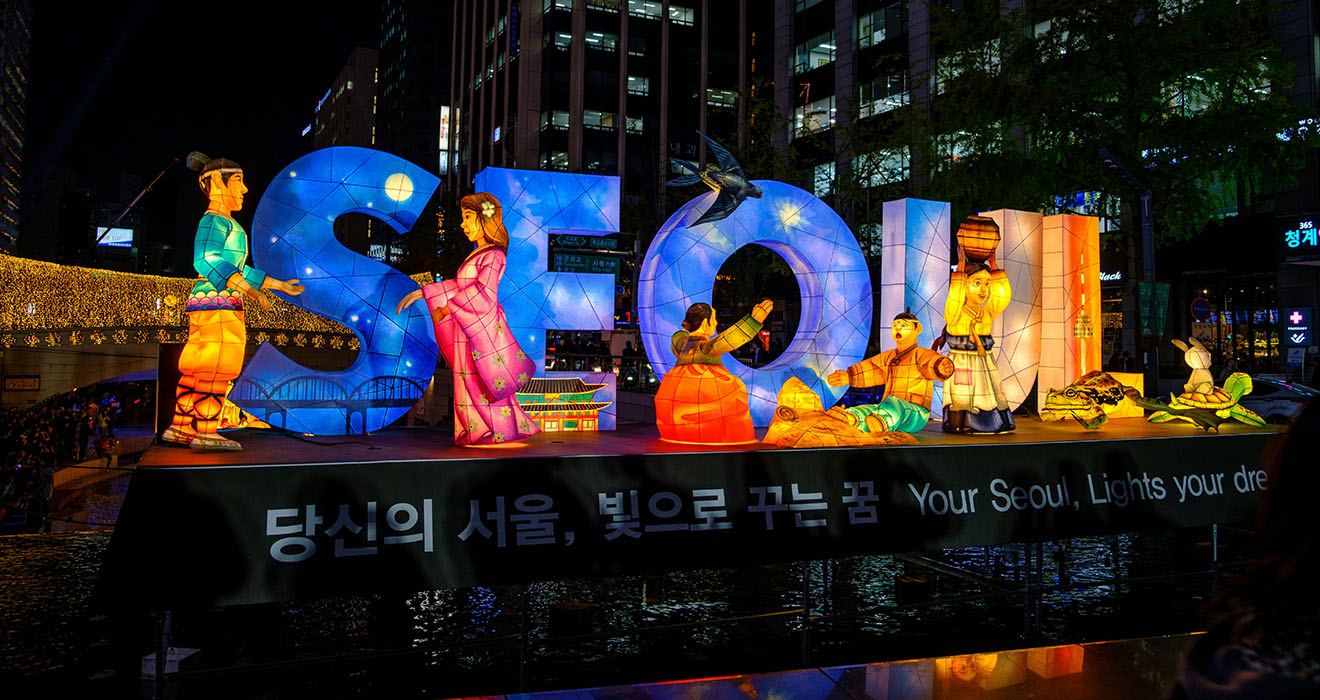Seoul
Where Tradition Meets Modernity
About Seoul
Seoul, the capital of South Korea, is a dynamic metropolis known for its modern skyscrapers, high-tech subways, and pop culture. At the same time, it's also home to ancient temples, palaces, and traditional markets. The city offers a unique blend of old and new, making it a fascinating destination for travelers.
Getting There and Around
Arrival
Airports: Incheon International Airport is the primary airport serving Seoul, located approximately 48 kilometers west of the city center. Gimpo International Airport handles domestic flights and some international flights.
Train Stations: Seoul Station is the central transportation hub for trains, including KTX high-speed services. Yongsan Station also serves as a major railway station in Seoul.
Bus Terminals: Express bus terminals such as Dongseoul Bus Terminal and Central City Terminal provide intercity bus services to and from Seoul.
Transportation
Public Transport Options: Seoul has an extensive public transportation system, including subways, buses, and taxis. The Seoul Metropolitan Subway is efficient and covers most areas of the city.
Car Rentals: Car rental services are available at the airports and various locations within the city.
Bike Shares: Seoul offers bike-sharing programs for convenient and eco-friendly urban transportation.
Tips: T-Money cards are recommended for seamless travel on public transportation.
Accommodations
Overview: Seoul provides a wide range of accommodations, from luxury hotels to budget-friendly guesthouses and traditional hanok stays.
Types of Accommodations: Options include hotels, motels, hostels, guesthouses, hanok stays, and serviced apartments.
Booking Tips: It's advisable to book accommodations in advance, especially during peak tourist seasons.
Local Regulations and Safety: Ensure that accommodations comply with safety regulations and have necessary certifications.
Accessibility: Many accommodations offer facilities for guests with disabilities or special needs.
Gangnam
Known for upscale hotels, shopping, and entertainment options.
Myeongdong
Popular for its vibrant street markets and diverse accommodation choices.
Hongdae
A youthful area with trendy guesthouses, hostels, and boutique hotels.
Insadong
Famous for traditional hanok stays and cultural experiences.
Itaewon
Diverse range of accommodations catering to international visitors.
Attractions and Activities
Gyeongbokgung Palace
The largest and most iconic palace of the Joseon Dynasty.
N Seoul Tower
Offers panoramic views of the city and surrounding mountains.
Bukchon Hanok Village
Preserves a traditional Korean village with hanok houses.
Changdeokgung Palace
Known for its beautiful gardens and architecture.
Lotte World Tower
One of the tallest buildings in the world with observation decks and a mall.
Dining and Nightlife
Culinary Scene
Seoul boasts a diverse culinary scene, offering traditional Korean cuisine, international flavors, and trendy dining experiences.
Itaewon
Known for its international dining options and vibrant nightlife scene.
Hongdae
Offers a mix of restaurants, cafes, and bars popular among students and artists.
Gangnam
Home to upscale dining establishments and trendy eateries.
Insadong
Features traditional tea houses, artisanal cafes, and authentic Korean restaurants.
Garosu-gil
Fashionable district with stylish cafes, dessert shops, and gourmet restaurants.
Festivals and Events
Seoul Lantern Festival
Annual event featuring mesmerizing lantern displays along the Cheonggyecheon Stream.
Seoul Kimchi Making & Sharing Festival
Celebrates Korea's iconic dish with kimchi-making activities and cultural performances.
Seoul International Fireworks Festival
Spectacular fireworks display held along the Han River.
Seoul Kimchi Cultural Festival
Showcases various types of kimchi and traditional kimjang culture.
Seoul Drum Festival
Brings together percussion performances from around the world.
Practical Information
Safety Tips
Seoul is generally safe, but travelers should remain vigilant against pickpocketing and petty theft in crowded areas.
Healthcare
Pharmacies: Pharmacies are widely available throughout the city, and many operate 24 hours.
Hospitals: Seoul has numerous hospitals and medical facilities offering quality healthcare services.
Emergency Services: In case of emergencies, dial 119 for fire and ambulance services, and 112 for police assistance.
Currency and Payment
Local Currency: South Korean Won (KRW)
Tipping Customs: Tipping is not customary in South Korea, except in certain exceptional circumstances.
Payment Methods Accepted: Credit and debit cards are widely accepted, and ATMs are readily available for cash withdrawals.
Connectivity
Mobile Networks: Major mobile network providers in South Korea include SK Telecom, KT, and LG Uplus, offering reliable coverage in Seoul.
SIM Cards: Prepaid SIM cards for tourists are available at the airports, convenience stores, and mobile carrier shops.
WiFi: Free public WiFi hotspots are accessible in many areas of Seoul, including subway stations, parks, and tourist attractions.
Local Customs and Etiquette
Culture Insights
Korean culture values respect, harmony, and collectivism. Confucian principles influence social interactions and behavior.
Greetings
Common greetings include 'annyeonghaseyo' (hello) and 'anyong' (informal hello). Bowing is a traditional form of greeting and showing respect.
Social Behavior
Maintain modesty and avoid loud or disruptive behavior in public places. Queueing and waiting in line are important social norms.
Cultural Taboos
Avoid pointing with your fingers, using red ink for names, and stepping over someone's legs or belongings.
